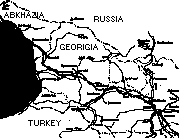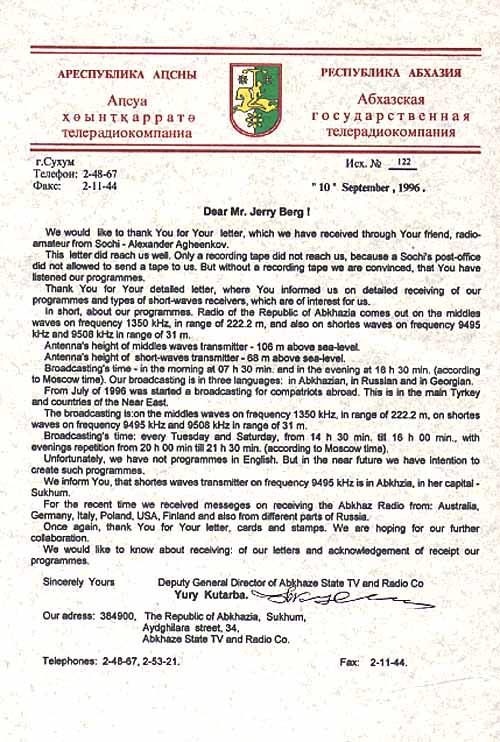 Return
to the Clandestine
Radio Intel QSL Gallery
Return
to the Clandestine
Radio Intel QSL Gallery
Voice of Abkhazia


Abkhazia is a small strip of land in northwestern
Georgia that hugs the Black Sea. Since most of the population is
Christian, Abkhazians felt a sense of national fervor and decided in 1989
to declare their independence from both the Soviet state of Georgia (which
is predominantly Muslim) and the USSR (which was atheist.) The collapse
of the Soviet Union in 1990 opened the gates, so to speak, for all of the
Soviet republics to become independent and Gerogia established its own
government and constitution a year later. Abkhazians refused to integrate
with Georgia since in 1921 Abkhazia had been proclaimed as a separate Soviet
republic. It was, according to some accounts, the pressure of influential
Georgian Bolsheviks which prompted Lenin to combine the territory into
the republic of Georgia.
The Voice of Abkhazia
began broadcasting on April 4, 1992, a few short months before a year-long
and bloody civil war was fought over Abkhazian sovereignty from Georgia.
It began as a covert "gray" clandestine, but on August 18, 1992, Abkhazian
rebels removed the Georgian flag on top of the parliament building in Sukhumi
and the station became the official outlet for the new government.
Fighting continued with periods of cease-fire, however, by October 1993
Abkhazian considered their territory to be "liberated" and sovereign.
In April 4, 1994, months of negotiations resulted
in a cease-fire entitled the "Memorandum of Understanding" and granted
Abkhazia a sense of autonomy. Accordingly, the de facto nation was
permitted to have its own constitution, legislation and could appropriate
state symbols, such as an anthem, flag, as well as maintaining internal
sovereignty. Foreign affairs and taxation, however, were to be conducted
by a joint Abkhazian - Georgian governmental organ.
September 1994 marked the beginning of trouble
for Abkhazia when Russia imposed a transport, and later, a sea blockade
on the republic. CIS peacekeeping forces remained on the Georgian
border past their mandate and tensions began to heighten in the Caucasus.
Georgia demanded the immediate repatriation of the estimated 100,000 Abkhazian
refugees who had fled in 1992 and 1993, however, the Abkhazian parliament
made no move to begin the process.
The political and military standoff continues
in 1998 with no clear resolution in sight. The Voice
of Abkhazia can be argued as a domestic broadcaster, but in light
of Abkhazia's de facto status and its lack of UN recognition it remains
as an overt "white" clandestine radio station.
With its tiny 5kw transmitter it has been received
in the United States and throughout Europe, bringing more attention to
the crisis that is strangling the former tourist resort.
Recent activity can be found here.
Background information for this article has been
summarized from Dr. Viacheslav A. Chirikba's 1997 article "Review
of Events for the Year 1996" and the translated Proposals
of Georgia on the Status of Abkhazia, Georgia.

 QSL courtesy of Jerry Berg.
QSL courtesy of Jerry Berg.


 Return
to the Clandestine
Radio Intel QSL Gallery
Return
to the Clandestine
Radio Intel QSL Gallery


